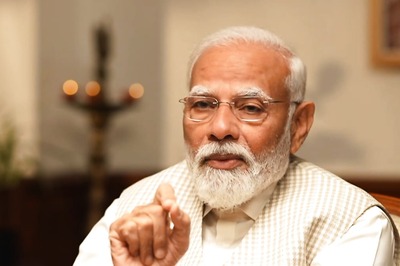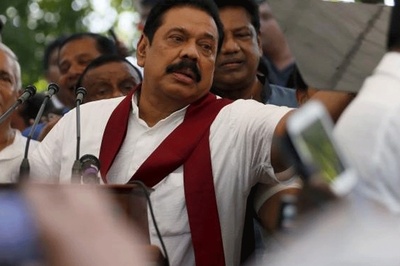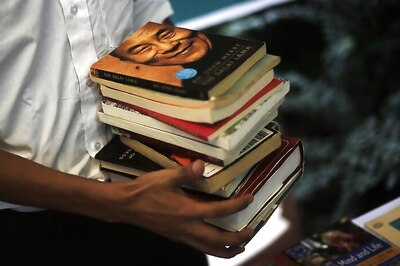
views
When the UP or Jharkhand Assembly attempts to push through legislation simply to protect members from Office of Profit Law, or when Priyanka Gandhi doubles as poll agent for her mama, then its clear that even state institutions and democratic functions are happily bent towards serving the needs of private families or individuals. But perhaps the most disastrous aspect of the "secession of the successful" is the decline of a social conscience.
No doubt, the 27 per cent quota in institutions of higher learning is Arjun Singh's political fishing net, designed to catch the fattest possible prize. It is Arjun Singh's way of embarrassing the Prime Minister, given the PM's popularity among the middle class. It is perhaps Arjun Singh's attempt to grab the OBC votes in Madhya Pradesh (elections coming up in 2008 after all) or going down in history as the Rajput with a vision.
Arjun Singh appears as an octogenarian careerist. A CV-builder even in dotage, still waiting into enroll into the highest job on offer with shining degrees in social justice and secularism. Of course Arjun Singh generally waits to protect his ministerial portfolio before he gives vent to his inner anguish about injustice. The same Arjun Singh who is today apparently determined to wage war for secularism, failed to resign when the Babri Masjid was demolished in 1992. The same Arjun Singh who is today the OBC hero, kept curiously silent when VP Singh first inaugurated Mandal politics. Arjun Singh's compulsions are always condescendingly political. Does the idiot multitude out there want education? Throw them a few quotas.
In response to Singh, "Mandal II" has begun. Medical students are on the streets and industrialists, software professionals, homemakers and executives are uniting in rage and outrage at the denial of opportunities. But there is a larger goal that the middle class, as it retreats into its generator-powered air conditioners and highly policed yet murderous nightlife, is forgetting. And this is the capacity to formulate and understand a complex issue. The denizens of colonies, apartment blocks and suburban condominiums are increasingly impatient with any form of nuance. On any issue, particularly on a complex issue like reservations, they demand set rigid positions. Mention the word "reservations" and the middle class screams "merit". Mention the word "quotas" and the middle class yells, "falling standards".
Perhaps 24-hour television debates are the culprit. The reason why every position on reservations is now characterised by screaming from opposing unassailable fortress in which both sides shoot down dissent with the arrows of unthinking hysteria. There is simply no attempt to seek a genuine middle ground.
The inescapable fact is that the Indian state has simply failed to provide justice to backward castes and Muslims. We live in an invisible apartheid where separate social and political universes are easy to ignore only because the colour of our skins is the same. If the skin colour of upper castes and lower castes was different, our society would be as brutally segregated a society as apartheid South Africa. The educated class has failed to realise the importance of what is called "a diverse classroom", or indeed a "diverse society", has failed to appreciate the ideal of diversity, has failed to understand that ours is a society in which God Himself apparently makes a distinction between who is allowed to come into his temple and who is not.
The Purusasukta from the Rig Veda remains a fundamental reminder of just how unequal and discriminatory Hindu society has been. Gods are supposed to be loving, gods suffer for their devotees, gods are ideals of compassion. Which other god in any world religion, except a Hindu God, cruelly declares that Brahmins are from the head, Kshatriyas from the arm, Vaishyas from the thigh, Sudras from the foot and Dalits are outcasts, not even part of the cosmic body? Where else does a religion sanction that Dalits are the perpetual filthy outsider, shoring up the Brahmin's cleanliness with his own perennial dirt? Institutionalised inequality is a shocking fact of our existence as modern Indians.
How many top industrial houses have tried to find out how many OBCs they actually employ? Has industry contributed to creating an equal society? Isn't it true that most companies employ a very small fraction of Muslims? Sure, the reason for this could be that levels of education within the Muslim community are low and there are few qualified enough to make it past the recruitment threshold. But rather than scream about the loss of merit and the fall in global competitiveness, should industry not plunge into the idealism of prosperity, where the aim of wealth creation is in the long run to create a just society?
Gaze on the experience of Tamil Nadu, a state with 69 per cent reservation, and a plethora of private educational institutes. In Tamil Nadu, there is no immediate visible impact on merit even with a high percentage of reservations. To take another trajectory: look at the astounding talent of little Budhia Singh from Orissa. The tiny child certainly should not be allowed to run 65 km and his guardians are clearly ignorant of his health and well-being. But there is little doubt that this son of an Orissa beggar, with a malnourished backward caste mother who sold him because she couldn't afford food, is a potential superstar. This little statistic from the Backward Caste schedule has the talent to perhaps one day become a world champion. What does that say about merit and backward castes?
As Dalitbahujan scholar Kancha Ilaiah has argued, Indian athletics will gain gold medals only when it is vigorously "Dalitised". If a Brahmin cannot even make himself a cup of tea, how on earth will he throw a javelin?
The 27 quotas are indefensible. It is a political masquerade. But reservations require far more complex debate than two ignorant armies on both sides yelling each other down on "justice" versus "merit". Between an intensely political Arjun Singh and an apolitical secessionist middle class, the debate on reservations has become a dangerous caricature.About the AuthorSagarika Ghose Sagarika Ghose has been a journalist for 20 years, starting her career with The Times of India, then moving to become part of the start-up team...Read Morefirst published:May 12, 2006, 18:55 ISTlast updated:May 12, 2006, 18:55 IST
window._taboola = window._taboola || [];_taboola.push({mode: 'thumbnails-mid-article',container: 'taboola-mid-article-thumbnails',placement: 'Mid Article Thumbnails',target_type: 'mix'});
let eventFire = false;
window.addEventListener('scroll', () => {
if (window.taboolaInt && !eventFire) {
setTimeout(() => {
ga('send', 'event', 'Mid Article Thumbnails', 'PV');
ga('set', 'dimension22', "Taboola Yes");
}, 4000);
eventFire = true;
}
});
window._taboola = window._taboola || [];_taboola.push({mode: 'thumbnails-a', container: 'taboola-below-article-thumbnails', placement: 'Below Article Thumbnails', target_type: 'mix' });Latest News
The term "secession of the successful" is a particularly evocative term. This phrase occurs in the late JK Galbraith's works as well as in the writings of other economists and describes, how the "successful" tend to "secede" from society as they get richer and more successful. That is, those who are successful tend to retreat into a totally private world. They use private electricity. They attend private schools and colleges. They live in private colonies, manned by private security guards. They socialise at private clubs, use only private transport and thus they cease to have any stake at all in the "public realm" or in the public world. In our country of course even the public realm is often "privatised".
When the UP or Jharkhand Assembly attempts to push through legislation simply to protect members from Office of Profit Law, or when Priyanka Gandhi doubles as poll agent for her mama, then its clear that even state institutions and democratic functions are happily bent towards serving the needs of private families or individuals. But perhaps the most disastrous aspect of the "secession of the successful" is the decline of a social conscience.
No doubt, the 27 per cent quota in institutions of higher learning is Arjun Singh's political fishing net, designed to catch the fattest possible prize. It is Arjun Singh's way of embarrassing the Prime Minister, given the PM's popularity among the middle class. It is perhaps Arjun Singh's attempt to grab the OBC votes in Madhya Pradesh (elections coming up in 2008 after all) or going down in history as the Rajput with a vision.
Arjun Singh appears as an octogenarian careerist. A CV-builder even in dotage, still waiting into enroll into the highest job on offer with shining degrees in social justice and secularism. Of course Arjun Singh generally waits to protect his ministerial portfolio before he gives vent to his inner anguish about injustice. The same Arjun Singh who is today apparently determined to wage war for secularism, failed to resign when the Babri Masjid was demolished in 1992. The same Arjun Singh who is today the OBC hero, kept curiously silent when VP Singh first inaugurated Mandal politics. Arjun Singh's compulsions are always condescendingly political. Does the idiot multitude out there want education? Throw them a few quotas.
In response to Singh, "Mandal II" has begun. Medical students are on the streets and industrialists, software professionals, homemakers and executives are uniting in rage and outrage at the denial of opportunities. But there is a larger goal that the middle class, as it retreats into its generator-powered air conditioners and highly policed yet murderous nightlife, is forgetting. And this is the capacity to formulate and understand a complex issue. The denizens of colonies, apartment blocks and suburban condominiums are increasingly impatient with any form of nuance. On any issue, particularly on a complex issue like reservations, they demand set rigid positions. Mention the word "reservations" and the middle class screams "merit". Mention the word "quotas" and the middle class yells, "falling standards".
Perhaps 24-hour television debates are the culprit. The reason why every position on reservations is now characterised by screaming from opposing unassailable fortress in which both sides shoot down dissent with the arrows of unthinking hysteria. There is simply no attempt to seek a genuine middle ground.
The inescapable fact is that the Indian state has simply failed to provide justice to backward castes and Muslims. We live in an invisible apartheid where separate social and political universes are easy to ignore only because the colour of our skins is the same. If the skin colour of upper castes and lower castes was different, our society would be as brutally segregated a society as apartheid South Africa. The educated class has failed to realise the importance of what is called "a diverse classroom", or indeed a "diverse society", has failed to appreciate the ideal of diversity, has failed to understand that ours is a society in which God Himself apparently makes a distinction between who is allowed to come into his temple and who is not.
The Purusasukta from the Rig Veda remains a fundamental reminder of just how unequal and discriminatory Hindu society has been. Gods are supposed to be loving, gods suffer for their devotees, gods are ideals of compassion. Which other god in any world religion, except a Hindu God, cruelly declares that Brahmins are from the head, Kshatriyas from the arm, Vaishyas from the thigh, Sudras from the foot and Dalits are outcasts, not even part of the cosmic body? Where else does a religion sanction that Dalits are the perpetual filthy outsider, shoring up the Brahmin's cleanliness with his own perennial dirt? Institutionalised inequality is a shocking fact of our existence as modern Indians.
How many top industrial houses have tried to find out how many OBCs they actually employ? Has industry contributed to creating an equal society? Isn't it true that most companies employ a very small fraction of Muslims? Sure, the reason for this could be that levels of education within the Muslim community are low and there are few qualified enough to make it past the recruitment threshold. But rather than scream about the loss of merit and the fall in global competitiveness, should industry not plunge into the idealism of prosperity, where the aim of wealth creation is in the long run to create a just society?
Gaze on the experience of Tamil Nadu, a state with 69 per cent reservation, and a plethora of private educational institutes. In Tamil Nadu, there is no immediate visible impact on merit even with a high percentage of reservations. To take another trajectory: look at the astounding talent of little Budhia Singh from Orissa. The tiny child certainly should not be allowed to run 65 km and his guardians are clearly ignorant of his health and well-being. But there is little doubt that this son of an Orissa beggar, with a malnourished backward caste mother who sold him because she couldn't afford food, is a potential superstar. This little statistic from the Backward Caste schedule has the talent to perhaps one day become a world champion. What does that say about merit and backward castes?
As Dalitbahujan scholar Kancha Ilaiah has argued, Indian athletics will gain gold medals only when it is vigorously "Dalitised". If a Brahmin cannot even make himself a cup of tea, how on earth will he throw a javelin?
The 27 quotas are indefensible. It is a political masquerade. But reservations require far more complex debate than two ignorant armies on both sides yelling each other down on "justice" versus "merit". Between an intensely political Arjun Singh and an apolitical secessionist middle class, the debate on reservations has become a dangerous caricature.




















Comments
0 comment